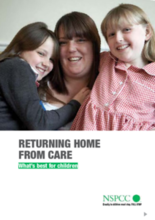This report, published by the National Society for the Prevention of Cruelty to Children (NSPCC) in the UK, highlights the need to improve outcomes for children leaving care and returning to parents or relatives. Over 90,000 children were ‘looked after’ in the formal care system in England at some point during 2011, a majority as a result of abuse or neglect. Although the most common outcome for children leaving care is to return home to a parent or relative, research has also shown that around half of children who come into care because of abuse or neglect in the UK suffer further abuse if they return home, with up to half of those returning to care. At the beginning of 2012, the NSPCC interviewed social workers and senior managers and consulted over 200 children and young people in care to better understand the problems associated with children returning home from care, and the action that needs to be taken to improve care for children. This report offers current data on children leaving care, interviews with social workers and senior managers working in the field of child welfare in the UK, and specific recommendations for both addressing the problems of reunification and developing a new approach to practice.
Disturbingly, research quoted in the report found that a child’s return home from care had only been planned in 40% of cases. In addition, 48% of the children and young people interviewed by the NSPCC said they were not consulted at all about their views on returning home. Over 70% of children consulted said they were not ready to return home. The NSPCC urges policymakers and practitioners to engage in work to improve the quality of assessment, planning, and preparation regarding when and if a child should be returned home and to increase the support for children and their families once they return to their families. Among its recommendations for reunification, the NSPCC suggests improving assessments; increasing collaboration amongst agencies, government, and local authorities and the standardization of best practices; and honoring children’s views and best interests in decision-making. Once children return home, it is also important to continue the provision of support to the children and their families to reduce the risk of continued abuse or return to care. Among their recommendations for supporting children and families, the NSPCC suggests providing families with services in counseling for alcohol and drug abuse, domestic violence, and mental health issues. The report concludes with a suggested framework for assessment, decision-making, planning and preparation, and continued communication with children and parents.
N.B. Data quoted in the report includes short-term placements in care. Data for children in care excluding short-term placements is 65,520 for the same period. The vast majority of these children are in foster placements. In England in 2011, 74% of children in care were in foster placements and only 10% in some form of residential facility. For fuller data about Children who are 'Looked After' in England, please click here.

